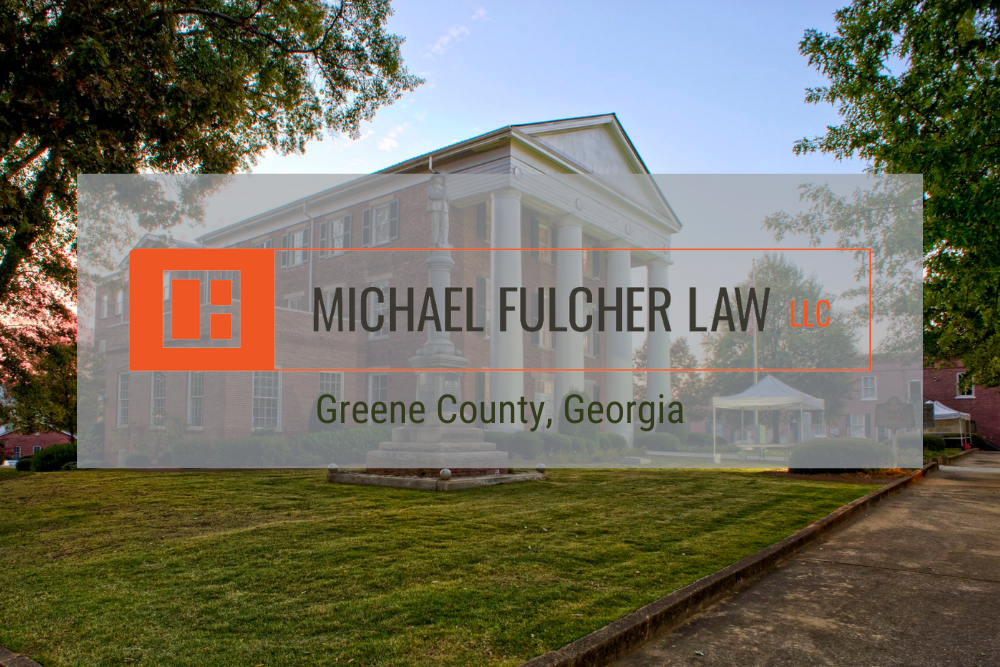Criminal Defense Lawyer in
Greene County, Georgia

Michael Fulcher Law is an experienced criminal defense lawyer serving the residence residing in Greene County, Georgia. Michael Fulcher is unwavering in his commitment to delivering exceptional legal representation to individuals confronting a diverse array of criminal charges. With an intimate familiarity of the local legal landscape and a deep understanding of the unique nuances that pertain to our community, Michael Fulcher channels his insights and strategic expertise to vigorously champion the rights and freedom of his clients.
Michael Fulcher Law is dedicated to providing individualized attention and steadfast support to every client who is seeking legal guidance. Whether your situation involves minor infractions or more serious felonies, Michael approaches each case with the utmost professionalism and a resolute determination to secure the most favorable outcome possible.
Opting for Michael Fulcher Law, who proudly serves Greene County, ensures that you have a committed and unyielding criminal defense lawyer firmly in your corner.
A lawyer can assist individuals in navigating the criminal justice system in Greene County, Georgia by providing guidance, evaluating their case, developing defense strategies, negotiating with the prosecution, representing them in court, and exploring options for reduced charges or alternative sentencing. They ensure that constitutional rights are protected, explain potential consequences, and offer support during post-conviction proceedings like appeals or record expungement. Ultimately, a lawyer’s expertise helps individuals receive fair treatment and pursue the best possible outcome.
The Georgia criminal process
The criminal process in Greene County, Georgia involves several key stages, from arrest to trial and potential appeal. When a crime is committed, law enforcement agencies conduct investigations, gather evidence, and make arrests if they believe there is sufficient evidence to proceed. The arrested individual is brought before a judge for an initial appearance, where bail may be set, and the charges are formally presented.
Preliminary Hearing
Next, a grand jury or a preliminary hearing determines whether there is enough evidence to proceed with a trial. If the case proceeds, the defendant is formally charged, and the pre-trial phase begins. During this phase, both the prosecution and defense exchange evidence, conduct depositions, and file motions.
Pre-trial Proceedings
Following pre-trial proceedings, the case proceeds to trial, where the prosecution presents its evidence, and the defense has an opportunity to challenge it and present its own case. A jury or judge determines the defendant’s guilt or innocence based on the evidence presented. If the defendant is found guilty, a sentencing hearing takes place to determine the appropriate punishment.
Sentencing
After sentencing, the defendant has the right to appeal the conviction or sentence within a specified timeframe. The appeals process involves reviewing the trial proceedings and identifying potential errors or constitutional violations.
It’s important to note that the criminal process can vary depending on the specific circumstances and the severity of the crime. Consulting legal resources, such as the Georgia Code and relevant case law, can provide further insights into the intricacies of the criminal process in Georgia.
Can a criminal record be expunged in Georgia?
Yes, it is possible to have a criminal record expunged in Georgia under certain circumstances. The process of expungement, also known as record restriction, allows individuals to have their criminal records sealed from public view. However, it’s important to note that not all types of convictions are eligible for expungement in Georgia.
Georgia law allows for expungement in cases where the charges were dismissed, nolle prossed, or resulted in a not guilty verdict. Additionally, some first-time misdemeanor convictions may be eligible for expungement after a certain period of time has passed and specific criteria are met.
To pursue expungement, individuals must file a petition with the court that handled their case. The petition must demonstrate eligibility and provide supporting documentation. The court will review the petition, and if approved, the record will be restricted, meaning it is sealed from public access. However, certain government agencies and law enforcement entities may still have access to the restricted records.
It’s important to consult with an experienced attorney who specializes in criminal law to determine your eligibility for expungement and guide you through the process.
What factors are considered for bail or bond in Greene County, Georgia?
Several factors are considered for bail or bond determinations in Georgia. These factors include the severity of the offense, the defendant’s criminal history, ties to the community, employment status, financial resources, and the potential flight risk posed by the defendant. The court also assesses the risk of harm to the community or witnesses, as well as the likelihood of the defendant appearing for future court proceedings.
Additionally, the court considers any other relevant factors presented by the prosecution or the defense. By evaluating these factors, the court determines an appropriate bail or bond amount and any necessary conditions to ensure the defendant’s appearance in court while maintaining public safety.
CALL US NOW
FOR A FREE CONSULTATION
Facing legal challenges, whether it’s a DUI, criminal charge, or navigating traffic-related offenses, requires a skilled advocate. Turn to Morgan County’s Michael Fulcher Law for a blend of legal expertise and unwavering client service from a former Georgia prosecutor. Discover the optimal legal solution for your situation by calling our criminal defense law firm at (706) 438-1555 or reaching out online. Schedule your free consultation today and gain a clearer path forward.
What are the potential penalties for a felony conviction in Georgia?
The potential penalties for a felony conviction in Greene County, Georgia can vary depending on the specific offense and its classification. Felonies in Georgia are categorized into different classes, such as felonies punishable by life imprisonment, felonies punishable by imprisonment for a term between one and twenty years, and felonies punishable by imprisonment for a term less than one year.
For felonies punishable by life imprisonment or a specific number of years, the court has the discretion to determine the exact sentence within the prescribed range. Factors such as the severity of the offense, the defendant’s criminal history, and any aggravating or mitigating circumstances can influence the sentence.
In addition to imprisonment, felony convictions in Georgia can also carry significant fines, restitution to victims, probation, community service, mandatory counseling or treatment programs, loss of certain rights, and potential long-term consequences such as difficulty finding employment or housing.
It is important to note that specific offenses may have additional penalties or mandatory minimum sentences mandated by Georgia law.
Navigating the legal system and understanding the potential penalties associated with a felony conviction can be complex. Consulting Michael Fulcher is crucial to evaluate the specifics of your case, build a strong defense, and seek the best possible outcome considering the circumstances.
How can I protect my rights if I believe they have been violated during an arrest in Georgia?
If you believe your rights have been violated during an arrest in Greene County, Georgia, there are steps you can take to protect yourself:
- Stay calm: It’s important to remain composed and cooperate with law enforcement officers while still asserting your rights.
- Document the incident: As soon as possible, write down or make a mental note of all the details surrounding the arrest, including the officers involved, any witnesses present, and any specific violations you believe occurred.
- Seek legal representation: Consult with an experienced criminal defense attorney who specializes in defending civil rights. They can provide guidance on your specific situation and help protect your rights throughout the legal process.
- Preserve evidence: If you have any physical evidence, such as photographs or videos of the incident, ensure that they are safely stored and available for your attorney to review.
- File a complaint: You have the right to file a complaint against the law enforcement officers involved. Contact the appropriate agency, such as the local police department or internal affairs division, to initiate an investigation into the alleged rights violation.
- Know your rights: Familiarize yourself with your constitutional rights, such as the right to remain silent, the right to an attorney, and the Fourth Amendment protections against unreasonable searches and seizures. This knowledge will help you assert your rights effectively.
Remember, seeking legal advice and representation is crucial when dealing with potential rights violations during an arrest. An attorney can guide you through the process, evaluate the strength of your case, and advocate for your rights to ensure a fair legal proceeding.
Practice Areas
Over the last fifteen years, criminal defense lawyer, Michael Fulcher proudly serving Greene County, has effectively and compassionately represented clients charged with the following offenses:
- Drug Possession and Distribution
- Drug Sales and Trafficking
- Theft and Armed Robbery
- Aggravated Assault and Battery
- Domestic Violence Offenses
- Traffic Ticket
- DUI Charges
- DUI Under 21
- DUI Child Endangerment
- ALS Hearings & License Suspensions
- Field Sobriety Tests
- Financial Crimes
- Weapons Charges
- Car Accidents
- Truck Accidents
If you have been charged with a felony or misdemeanor criminal offense in the middle Georgia area, contact Michael Fulcher Law today for a free consultation and case assessment.
AMAZING WORK
“Mr. Fulcher has been tremendously helpful with my case. Since hiring him he has consistently returned my calls as quickly as he can. We discussed an ideal outcome, and I set about doing exactly as he said. Following his advice we were able to get a very favorable outcome. He is always quick to answer any questions, and has stayed very engaged with me throughout this ordeal. Michael provides excellent counsel, and I would recommend him to anyone!”
— TOM




